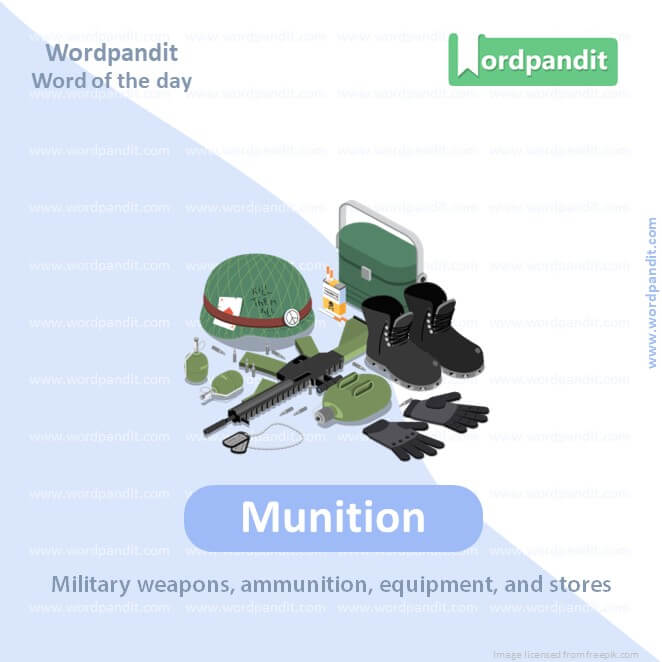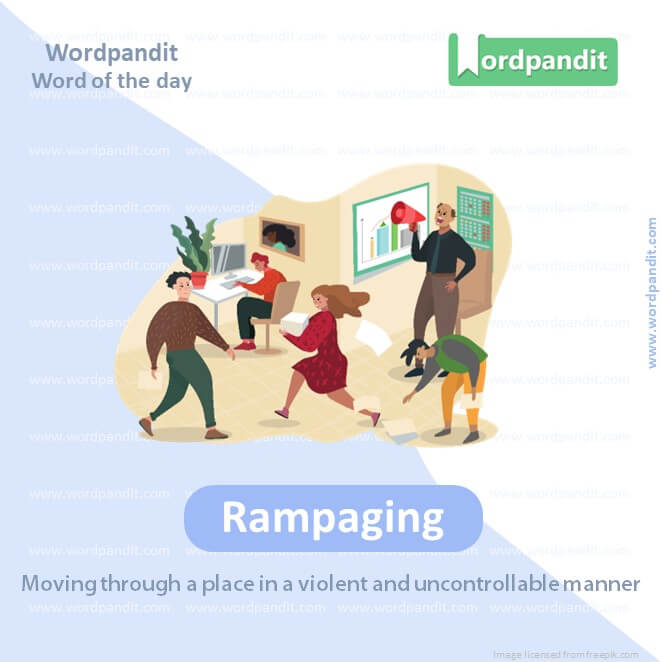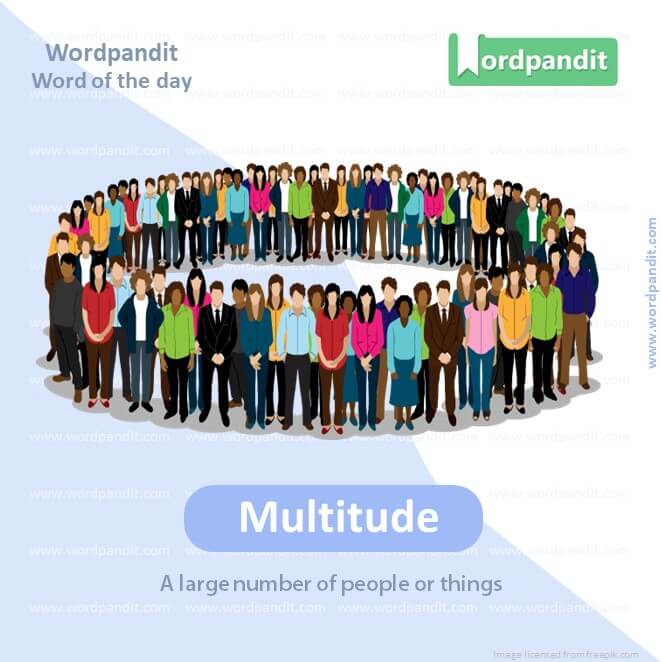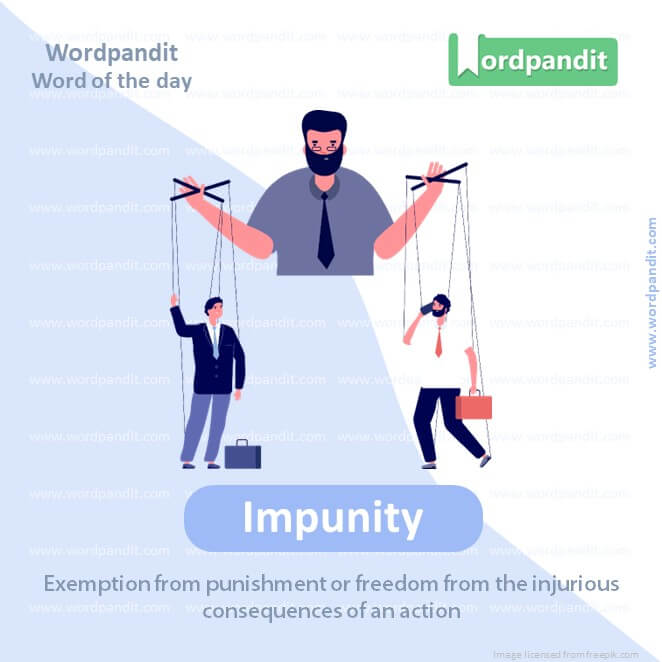Daily Vocabulary Words: List of Daily Used Words
Hi there. Welcome to this special section @ Wordpandit.
Our endeavour here is straightforward: highlighting important daily vocabulary words, you would encounter in The Hindu. This is your repository of commonly used words; essentially, we are posting a list of daily used words. Hence, this has significant practical application as it teaches you words that are commonly used in a leading publication such as The Hindu.
Visit the website daily to learn words from The Hindu.

WORD-1: MUNITION
CONTEXT: Recent border tensions have prompted both nations to increase their stockpile of munitions, raising concerns among international observers.
SOURCE: The Hindu
EXPLANATORY PARAGRAPH: Imagine soldiers having a lot of tools like guns, bullets, and bombs to use when they need to defend or fight. The word “munition” means all those tools that soldiers use. It’s like how you have toys to play with; soldiers have “munition” to help them do their job.
MEANING: Military weapons, ammunition, equipment, and stores (noun).
PRONUNCIATION: muh-NISH-un
SYNONYMS: Arsenal, weaponry, armament, ordnance, arms, ammo, materiel
USAGE EXAMPLE:
1. The military base stored a large amount of munition.
2. It is important to handle munition with care.
3. They were running low on munition during the battle.
4. The rebels seized the munition depot.

WORD-2: RAMPAGING
CONTEXT: The city witnessed rampaging protests last night as citizens voiced their displeasure against the new regulations.
SOURCE: The Hindu
EXPLANATORY PARAGRAPH: Imagine a big elephant running around and knocking everything over because it’s angry or scared. That’s what “rampaging” means – moving around wildly and causing damage.
MEANING: Moving through a place in a violent and uncontrollable manner (verb).
PRONUNCIATION: ram-PAYJ-ing
SYNONYMS: Raging, rioting, running wild, wreaking havoc, berserk, wild, uncontrolled
USAGE EXAMPLE:
1. The rampaging bull knocked over fences and scared the villagers.
2. The storm went rampaging through the town.
3. The fans started rampaging after the game.
4. The fire rampaged through the forest.

WORD-3: SEETHING
CONTEXT: The local community is seething over the environmental degradation caused by unchecked industrial growth in the region.
SOURCE: The Hindu
EXPLANATORY PARAGRAPH: Imagine a pot of water boiling with lots of bubbles and steam. Now, think of someone being very, very angry, but trying not to show it. That’s “seething” – it’s like the boiling water inside them.
MEANING: Filled with intense but unexpressed anger (adjective).
PRONUNCIATION: SEE-thing
SYNONYMS: Fuming, boiling, burning, enraged, simmering, livid, irate
USAGE EXAMPLE:
1. She was seething with anger after the argument.
2. Even though he smiled, I could tell he was seething inside.
3. The crowd was seething with frustration.
4. Behind his calm face, he was seething.
WORD-4: RELENTLESS
CONTEXT: Despite relentless efforts by rescue teams, the rising floodwaters have hampered evacuation processes in the delta regions.
SOURCE: The Hindu
EXPLANATORY PARAGRAPH: Think of a train that never stops, no matter what. It keeps going and going without taking a break. “Relentless” means something that doesn’t stop or give up, even if things get hard.
MEANING: Continuing without pause or interruption, especially in a determined way. (adjective)
PRONUNCIATION: re-LENT-less
SYNONYMS: Unyielding, persistent, continuous, unceasing, perpetual, determined
USAGE EXAMPLE:
1. The relentless rain lasted for days.
2. Her relentless determination helped her achieve her goals.
3. The athletes showed relentless effort during the race.
4. He was relentless in his pursuit of justice
WORD-5: SECULARISM
CONTEXT: The panel discussion on secularism and its relevance in contemporary society drew intellectuals and scholars from various fields.
SOURCE: The Hindu
EXPLANATORY PARAGRAPH: Imagine a big playground where kids from different schools play together and nobody cares which school they come from. “Secularism” is like that playground, but instead of schools, it’s about religions. It means that everyone is treated the same, no matter what their beliefs are.
MEANING: The principle of keeping government and religious beliefs separate, treating all religions equally. (noun)
PRONUNCIATION: SEK-yuh-luh-rizm
SYNONYMS: Non-religiousness, irreligion, impartiality, neutrality, non-sectarianism
USAGE EXAMPLE:
1. The country believes in secularism and treats all religions with respect.
2. Secularism promotes harmony among different religious groups.
3. The principle of secularism is important for democracy.
4. She believes that secularism is the way forward for peace.

WORD-6: MULTITUDE
CONTEXT: The festival, celebrated across the nation, saw a multitude of traditions and customs being showcased in harmony.
SOURCE: The Hindu
EXPLANATORY PARAGRAPH: Imagine going to a big party with lots and lots of people. There are so many people that you can’t even count them all. “Multitude” means a very big number of something, like people or things.
MEANING: A large number of people or things. (noun).
PRONUNCIATION: MUL-ti-tood
SYNONYMS: Throng, crowd, mass, host, horde, legion, myriad
USAGE EXAMPLE:
1. A multitude of stars shone brightly in the sky.
2. The singer was greeted by a multitude of fans.
3. There’s a multitude of reasons to be thankful.
4. A multitude of birds took flight at once.

WORD-7: IMPUNITY
CONTEXT: Human rights activists have condemned the actions of rogue elements within the security forces, asserting that crimes should not go unpunished with impunity.
SOURCE: The Hindu
EXPLANATORY PARAGRAPH: Imagine someone doing something wrong, like taking a cookie without asking, and not getting into trouble for it. “Impunity” means doing something without worrying about getting punished or facing any bad consequences.
MEANING: Exemption from punishment or freedom from the injurious consequences of an action (noun).
PRONUNCIATION: im-PYOO-ni-tee
SYNONYMS: Immunity, exemption, freedom, license, latitude, protection, privilege
USAGE EXAMPLE:
1. He stole the candy with impunity since no one was watching.
2. The dictator ruled with impunity, never facing consequences for his actions.
3. The laws should be changed so that people don’t act with impunity.
4. She spoke her mind with impunity, never fearing backlash.
WORD-8: PYRE
CONTEXT: The sacred pyre, a symbol of reverence and remembrance, burned brightly as the village commemorated its annual ritual.
SOURCE: The Hindu
EXPLANATORY PARAGRAPH: Have you seen a big pile of wood set on fire? People sometimes make these fires, called “pyres,” for special ceremonies or to remember someone who has passed away. It’s a big, bright, warm fire made of stacked wood.
MEANING: A heap of wood or other combustibles on which a body is burned, often as part of a funeral rite. (noun).
PRONUNCIATION: PY-er
SYNONYMS: Bonfire, funeral pyre, blaze, inferno, conflagration, flame, beacon
USAGE EXAMPLE:
1. The villagers gathered around the pyre to pay their respects.
2. The pyre burned brightly, lighting up the night sky.
3. The wood was collected to build a pyre.
4. As the pyre was lit, everyone observed a moment of silence.
WORD-9: COALESCED
CONTEXT: Various grassroots organizations have coalesced to form a unified front against the proposed infrastructural project.
SOURCE: The Hindu
EXPLANATORY PARAGRAPH: Imagine a lot of tiny raindrops coming together to form a big puddle. That’s what “coalesced” means – different things coming together to make something bigger or united.
MEANING: To come together to form one mass or whole. (verb).
PRONUNCIATION: koh-uh-LESSED
SYNONYMS: Merged, combined, united, amalgamated, fused, integrated, blended
USAGE EXAMPLE:
1. The two companies coalesced to form a bigger one.
2. Over time, the different communities coalesced into a single city.
3. Her ideas coalesced into a comprehensive plan.
4. Various groups coalesced to protest against the decision.
WORD-10: HULLABALOO
CONTEXT: Amidst the hullabaloo of the political rallies, citizens are seeking clarity on policies and actionable agendas.
SOURCE: The Hindu
EXPLANATORY PARAGRAPH: Imagine being at a place where everyone is talking loudly, things are falling, and music is playing – all at the same time! It’s noisy and confusing. “Hullabaloo” means a big noise or fuss, usually because people are excited or upset about something.
MEANING: A noisy commotion or uproar. (noun).
PRONUNCIATION: HULL-uh-buh-loo
SYNONYMS: Uproar, commotion, ruckus, fuss, clamor, tumult, brouhaha
USAGE EXAMPLE:
1. There was a hullabaloo in the market
when the celebrity arrived.
2. What’s all the hullabaloo about?
3. The children made a hullabaloo as they played in the park.
4. The surprise announcement caused quite a hullabaloo in the community.
Vocabulary Words with Meaning
Penetrating the rich tapestry of language, the essence of ‘vocabulary words with meaning’ is a crucial aspect. It’s these seeds of knowledge that bud into fluent conversations and comprehensive understanding. The knack of grasping ‘vocabulary words with meaning’ is pivotal in language learning, but it demands a nuanced approach and strategy.
Learning ‘vocabulary words with meaning’ isn’t about mechanically memorizing heaps of words. It’s about building connections and creating a profound understanding of these words. A promising approach to assimilate ‘vocabulary words with meaning’ involves utilizing a wide range of resources including literature, films, music, and digital content. This immersion provides a broad context and diverse settings for these words, simplifying their comprehension and use.
When you’re focusing on ‘vocabulary words with meaning’, remember to incorporate memory-enhancing techniques into your learning regimen. Tools like flashcards or recall-based applications can aid significantly in long-term retention of these words. Additionally, mnemonic strategies, associating words with distinctive images or stories enhance memory recall and understanding.
The journey of mastering ‘vocabulary words with meaning’ also benefits greatly from practice and application. Engage in conversations using the language, express your thoughts in writing, and try to incorporate newly learned words into your routine. This not only enhances your familiarity with the words but also aids in an intimate understanding of their connotations and denotations.
To sum up, learning ‘vocabulary words with meaning’ is akin to assembling a jigsaw puzzle: it requires patience, strategy, and persistence. But the picture that finally emerges is a beautiful tapestry of language – vivid, articulate, and expressive. So, set your sails toward the voyage of ‘vocabulary words with meaning’, and discover the joy of speaking and understanding a language with finesse.











